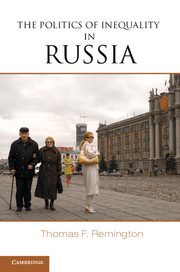Book contents
- Frontmatter
- Contents
- List of Figures
- List of Tables
- Preface
- 1 The Political Sources of Income Inequality in Russia
- 2 Employment, Earnings, and Welfare in the Russian Transition
- 3 Regime Diversity in the Russian Regions
- 4 Democracy and Inequality in the Russian Regions
- 5 Regional Regimes and the Labor Market: Evidence from the NOBUS Survey
- 6 Helping Hands or Grabbing Hands? Government-Business Relations in the Regions
- 7 Accounting for Regime Differences
- 8 After the Crash
- Index
- References
1 - The Political Sources of Income Inequality in Russia
Published online by Cambridge University Press: 05 June 2012
- Frontmatter
- Contents
- List of Figures
- List of Tables
- Preface
- 1 The Political Sources of Income Inequality in Russia
- 2 Employment, Earnings, and Welfare in the Russian Transition
- 3 Regime Diversity in the Russian Regions
- 4 Democracy and Inequality in the Russian Regions
- 5 Regional Regimes and the Labor Market: Evidence from the NOBUS Survey
- 6 Helping Hands or Grabbing Hands? Government-Business Relations in the Regions
- 7 Accounting for Regime Differences
- 8 After the Crash
- Index
- References
Summary
Income inequality in Russia has almost doubled since the end of the communist era. It has risen in waves: first as a sharp burst in the early years of the transition; then, following a decline in the late 1990s and early 2000s, it rose again slowly and steadily for much of the 2000s as incomes increased for all strata but more rapidly for those at the upper end of the scale. The deepening of inequality in the 1990s and 2000s also had a strong regional dimension as some regions prospered whereas others were stuck in poverty. The economic crisis of 2008–2009 halted the growth of incomes and cost millions their jobs. Since incomes leveled off more at the top end than the bottom, the crisis has also temporarily halted the increase in inequality. As of 2008, Russia's Gini index stood at 42.3, same as in 2007, according to the state statistical agency, whereas the ratio of the income of the top decile to that of the bottom was 16.9 (up from 16.8 in 2007). The richest quintile received about 47.9% of total income, the same share as in 2007. Overall inequality in Russia is comparable to that of the United States and greater than that of most other postcommunist countries – comparisons we will explore in more detail later.
- Type
- Chapter
- Information
- The Politics of Inequality in Russia , pp. 1 - 34Publisher: Cambridge University PressPrint publication year: 2011



